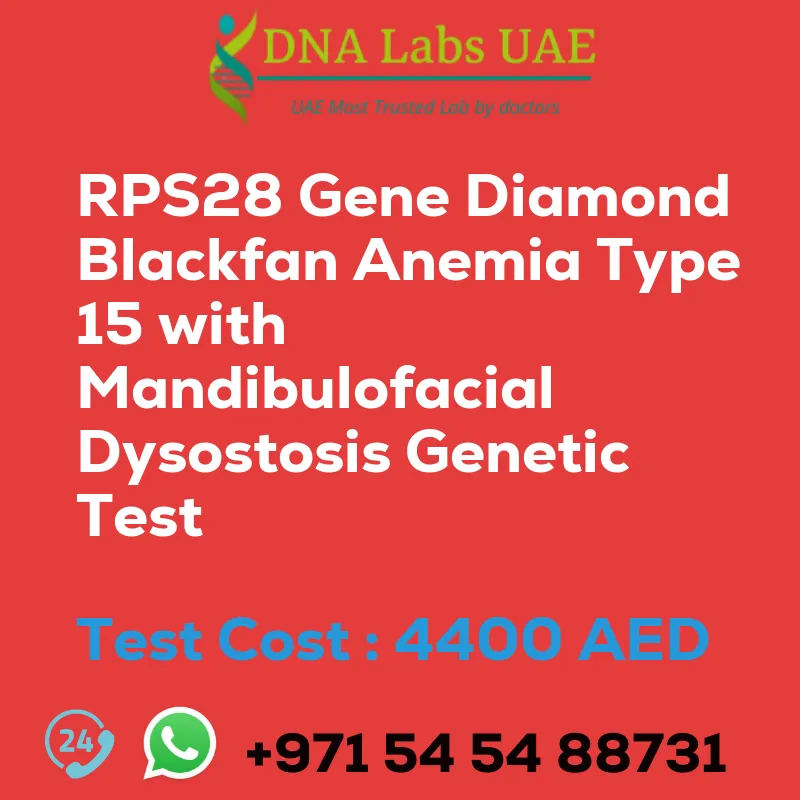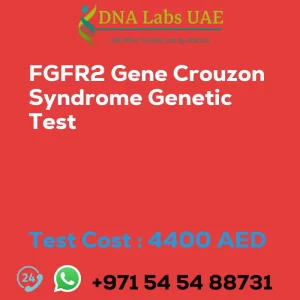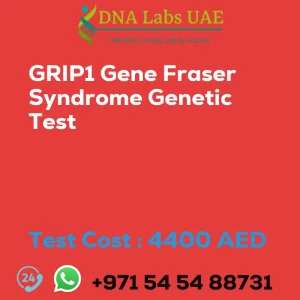RPS28 Gene Diamond Blackfan Anemia Type 15 with Mandibulofacial Dysostosis Genetic Test
Test Name: RPS28 Gene Diamond Blackfan Anemia Type 15 with Mandibulofacial Dysostosis Genetic Test
Components: Blood or Extracted DNA or One drop Blood on FTA Card
Price: 4400.0 AED
Sample Condition: Blood or Extracted DNA or One drop Blood on FTA Card
Report Delivery: 3 to 4 Weeks
Method: NGS Technology
Test Type: Dysmorphology
Doctor: Pediatrics
Test Department: Genetics
Pre Test Information: Clinical History of Patient who is going for RPS28 Gene Diamond Blackfan Anemia Type 15 with Mandibulofacial Dysostosis NGS Genetic DNA Test. A Genetic Counselling session to draw a pedigree chart of family members affected with RPS28 Gene Diamond Blackfan Anemia Type 15 with Mandibulofacial Dysostosis NGS Genetic DNA Test gene RPS28
Test Details
The RPS28 gene is associated with Diamond-Blackfan anemia type 15, which is a rare genetic disorder characterized by a decrease in the production of red blood cells. This condition can lead to symptoms such as anemia, fatigue, pale skin, and an increased risk of infections. In some cases, individuals with Diamond-Blackfan anemia type 15 may also have mandibulofacial dysostosis, which is a condition that affects the development of the jaw and facial bones. This can result in features such as a small jaw, cleft palate, and abnormal positioning of the ears.
NGS (Next-Generation Sequencing) genetic testing is a method used to analyze multiple genes simultaneously, allowing for the identification of genetic mutations associated with specific conditions. In the case of Diamond-Blackfan anemia type 15 with mandibulofacial dysostosis, NGS genetic testing can be used to detect mutations in the RPS28 gene, confirming the diagnosis.
Genetic testing can provide valuable information about the underlying cause of a genetic disorder, allowing for a better understanding of the condition and potentially guiding treatment options. It can also help with genetic counseling and family planning decisions. However, it is important to consult with a healthcare professional or genetic counselor to understand the implications of the test results and to discuss any concerns or questions.
| Test Name | RPS28 Gene Diamond Blackfan anemia type 15 with mandibulofacial dysostosis Genetic Test |
|---|---|
| Components | |
| Price | 4400.0 AED |
| Sample Condition | Blood or Extracted DNA or One drop Blood on FTA Card |
| Report Delivery | 3 to 4 Weeks |
| Method | NGS Technology |
| Test type | Dysmorphology |
| Doctor | Pediatrics |
| Test Department: | Genetics |
| Pre Test Information | Clinical History of Patient who is going for RPS28 Gene Diamond Blackfan anemia type 15 with mandibulofacial dysostosis NGS Genetic DNA Test. A Genetic Counselling session to draw a pedigree chart of family members affected with RPS28 Gene Diamond Blackfan anemia type 15 with mandibulofacial dysostosis NGS Genetic DNA Test gene RPS28 |
| Test Details |
The RPS28 gene is associated with Diamond-Blackfan anemia type 15, which is a rare genetic disorder characterized by a decrease in the production of red blood cells. This condition can lead to symptoms such as anemia, fatigue, pale skin, and an increased risk of infections. In some cases, individuals with Diamond-Blackfan anemia type 15 may also have mandibulofacial dysostosis, which is a condition that affects the development of the jaw and facial bones. This can result in features such as a small jaw, cleft palate, and abnormal positioning of the ears. NGS (Next-Generation Sequencing) genetic testing is a method used to analyze multiple genes simultaneously, allowing for the identification of genetic mutations associated with specific conditions. In the case of Diamond-Blackfan anemia type 15 with mandibulofacial dysostosis, NGS genetic testing can be used to detect mutations in the RPS28 gene, confirming the diagnosis. Genetic testing can provide valuable information about the underlying cause of a genetic disorder, allowing for better understanding of the condition and potentially guiding treatment options. It can also help with genetic counseling and family planning decisions. However, it is important to consult with a healthcare professional or genetic counselor to understand the implications of the test results and to discuss any concerns or questions. |








